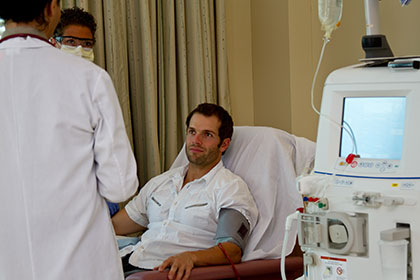
一般来说, 静脉注射免疫球蛋白(IVIG) 治疗 是 被认为是一种标准、有效和安全的治疗方法。 尽管 IVIG 治疗耐受性良好,但可能会出现长期不良副作用.
获取您的 IVIG 剂量
在家输液IVIG 主要用于 用于治疗多种危及生命的疾病,这些疾病的患者要么免疫系统功能失调,要么缺乏抗体等免疫成分。这种疗法可以延长免疫缺陷、自身免疫和神经系统疾病患者的预期寿命,并改善他们的生活质量。
如果患者患有原发性和继发性免疫缺陷,需要反复输注IVIG,则这种治疗可能需要终生。这些患者通常会经历常见的副作用,有时还可能出现IVIG的长期副作用。
IVIG的副作用
IVIG 的常见副作用
IVIG 的副作用可能因患者而异,取决于他们的健康状况。约四分之一的患者在治疗过程中会出现一些常见的 IVIG 副作用。 IVIG治疗.
如果您接受较大剂量的 IVIG,则更有可能出现轻微且短暂的 IVIG 副作用。
常见的副作用包括:
- 头痛 或恶心
- 冲洗
- 不适
- 发冷或发烧
- 胃痛
- 胸部不适
- 疲劳
- 昏睡
这些轻微的静脉注射免疫球蛋白症状可以通过降低静脉输注速度来缓解。但是,如果您在输注过程中或之后感到持续性头痛或任何其他上述症状无法缓解,请立即咨询您的医疗保健提供者。
获得 IVIG 共同支付援助
IVIG 财务援助IVIG 的不良反应和长期副作用
与某些仅对单一疗程有反应的疾病不同 静脉注射免疫球蛋白(IVIG)治疗患有慢性疾病的患者需要反复进行IVIG输注。例如,对于原发性免疫缺陷病 (PID) 或神经系统疾病,患者可能需要长期接受IVIG慢性治疗才能维持病情改善。
关于静脉注射免疫球蛋白(IVIG)长期副作用的数据有限。据报道,在极少数情况下,长期静脉注射免疫球蛋白治疗可导致严重的副作用,例如:
 1.肾脏和血液学副作用
1.肾脏和血液学副作用
研究表明,长期接受 IVIG 治疗的患者更容易出现肾衰竭(肾脏停止工作,无法过滤血液和清除体内废物的一种情况)。
支持这一假设,一项回顾性研究 166名神经系统疾病患者 血细胞比容(血液水平)下降,GFR(肾小球滤过率)下降 20% 或更多这些患者接受 IVIG 输注,剂量范围为 0.441 – 2.58 g/kg/月,持续 1 年。
2.血栓栓塞并发症
血栓栓塞并发症也属于长期静脉注射免疫球蛋白(IVIG)副作用。如果患者既往有以下病史: 冠状动脉疾病或心血管疾病,并长期接受 IVIG 输注,则 血栓栓塞并发症较高 在这些患者中。
一项研究表明 11.3% 接受常规 IVIG 治疗的患者出现血栓栓塞并发症 在24个月的时间内。研究人员认为IVIG可能在血栓栓塞并发症中发挥了促进作用。
3.无菌性脑膜炎
接受 IVIG 治疗的患者也 经历急性无菌性脑膜炎 (一种称为 脑膜 无菌性脑膜炎(覆盖中枢神经系统的炎症)的具体病理生理机制尚不清楚,但现有文献显示,这是 IVIG 引起的副作用。
结论
大量研究显示,IVIG 治疗被认为是一种安全有效的治疗方法,可用于治疗各种疾病。虽然可能会出现长期副作用,但这些副作用较为罕见,而且关于 IVIG 长期副作用的数据仍然匮乏。
如果您有兴趣了解有关 IVIG 不同方面的更多信息,请访问我们的 IVIG 患者资源中心.
参考:
- Levine, AA, Levine, TD, Clarke, K., & Saperstein, D. (2017).神经系统疾病患者长期静脉注射免疫球蛋白治疗的肾脏和血液学副作用。 肌肉和神经, 56(6), 1173-1176.
- Kapoor, M., Spillane, J., Englezou, C., Sarri-Gonzalez, S., Bell, R., Rossor, A., … & Carr, A. (2020).IVIg 血栓栓塞风险:炎症性神经病变患者的发病率和危险因素。 神经病学, 94(6),e635-e638。
- Rajabally, YA, & Kearney, DA (2011).神经病变患者静脉注射免疫球蛋白治疗的血栓栓塞并发症:一项为期两年的研究。 神经科学杂志, 308(1-2), 124-127.
- White, DA, & Leonard, MC (2007).高剂量静脉注射免疫球蛋白治疗急性卒中。 美国卫生系统药学杂志, 64(15), 1611-1614.













